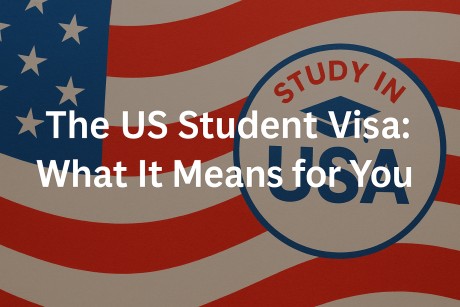US Student Visa Crackdown: Impact on International Students
CAREER COUNSELING WITH CHAIFRY
Chaifry
8/19/20254 min read


Hey there, if you are a student thinking about studying in the US or already there, you have probably heard about changes to student visas. It is causing worry for many, especially from India. Let us break it down simply, like chatting over chai, with just the facts and what they mean for you. In 2025, the US government cancelled over 6,000 international student visas. The State Department says it is due to breaking US laws, staying longer than allowed, or other issues. Governments can be strict, especially with immigration. Of these, about 4,000 were for criminal issues like assault, driving after drinking, burglary, or even speeding tickets.
Another 200 to 300 cases fall under a law called INA Section 3B, which covers acts that could harm people or break rules. Many cases involve students in protests.
Marco Rubio, the Secretary of State, said in May that thousands of visas were cancelled since January, and more may follow. He said, "We're going to keep revoking visas for people who are guests here but causing trouble in our colleges." They aim to keep things safe, but it affects students’ plans.
This impacts real people. Mahmoud Khalil, a Columbia University graduate, was arrested at his university home in March. Rumeysa Ozturk, a Turkish student at Tufts, was detained while going to a Ramadan event. Rasha Alawieh, a Brown University professor, was deported after content was found on her phone. Xiaotian Liu, a PhD student at Dartmouth, is fighting in court because his visa was revoked without warning. A Turkish student at University of Minnesota was detained for a past driving issue.
Over 80 universities, including Harvard, Yale, Stanford, Columbia, University of California (57 visas cancelled), and Ohio State (7), are affected.
New Rules on Social Media and Visa Applications
In May 2025, the US stopped student visa appointments to add social media checks. Since June 19, if you are applying for F (academic), M (vocational), or J (exchange) visas, you must make your social media public.
Officers look for signs you might oppose American people, culture, or government. If your accounts are private, they might think you are hiding something and deny your visa. An official said, "Americans expect us to keep the country safe."
This affects top universities. For Harvard, the government froze $2.65 billion in funds and tried to stop new international students for six months. Harvard challenged this in court, calling it unfair. A judge paused it, but uncertainty remains. Harvard’s president, Alan Garber, said they are making backup plans. One student there said, "Without us, Harvard isn’t Harvard." International students make up 27% of Harvard, nearly 7,000. Some Chinese students in fields like AI are also targeted.
How It Affects Students
International students, over 1.1 million from 210+ countries in 2023-24, add $44 billion to the US economy yearly, supporting 370,000 jobs. But many now regret choosing the US.
Ainul Hussein, a 24-year-old from India, got a Master’s scholarship in New Jersey but worries: "I might lose my scholarship if I wait. I bought flights." Oliver Cropley, 27, from the UK, lost 300 pounds on a visa fee for a Kansas program. "It’s a big letdown," he said. A Shanghai student at University of Pennsylvania said, "I regret it. I might get sent back without my degree." Alfred Williamson from Wales at Harvard said, "We’re pawns in a game we can’t control."
Delays risk scholarships and plans. Universities expect 30 to 40% fewer international students this fall. Labs are closing, funding is cut by half, and courses reduced by 40%. A professor from a top school said they lost 20 students, hurting research.
For Indian students, it is tough. Many go for engineering or MBA. On X, people say this hits Indian and Chinese students hard, affecting billions in revenue.
What People Say and Court Fights
The government uses a 1952 law to remove people who might cause issues. Rubio pointed to criminal records for safety. The ACLU says, "No president should kick people out for their views." Democrats call it unfair. Courts restored 133 students’ status, and Harvard’s ban is on hold. Ireland’s leader, Simon Harris, raised concerns about social media checks.
Tips for You
If you are planning to study in the US or already there, here is what to do:
Check Social Media: Make accounts public when applying. Remove posts that could seem risky, like strong opinions. Better safe than sorry.
Know Legal Risks: Even a speeding ticket can cause issues. Be cautious in protests, as your visa is temporary.
Stay Updated: Check US embassy websites for visa slots. Expect delays or denials.
Explore Options: Canada, Australia, UK, or Europe have good study programs with easier visas. Germany and Singapore are popular for Indians.
Get Help: Contact your university’s international office. They have plans. Consider immigration lawyers or groups like NAFSA.
Protect Scholarships: Document payments like flights and ask about delaying if visas are late.
For current students, be careful on campus issues but know your rights.
The Bigger Picture
This changes how people view US education. America was a top study destination, but detentions and deportations make students hesitate. A consultant in Guangzhou said, "Fewer will choose the US." This hurts STEM research, where international students contribute heavily.
The $44 billion economy and 370,000 jobs are at risk. For India, with lakhs of students going yearly, a drop affects families too. It is about balancing safety and openness. Universities value free thought, but governments prioritize protection.
That is the 2025 US student visa situation. It is a challenge, but do not lose hope. Many succeed, and courts are helping. You are not alone; communities like Chaifry share info and support. Stay informed, manage your online presence, and explore all paths. Education matters, wherever you go. Got questions? We are in this together.
